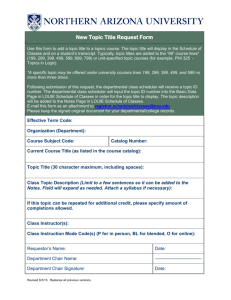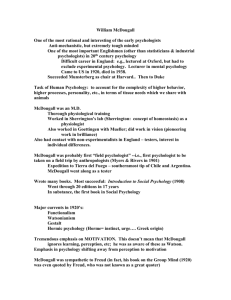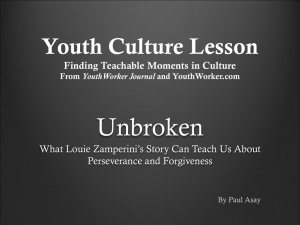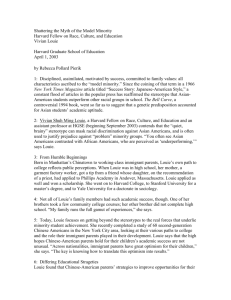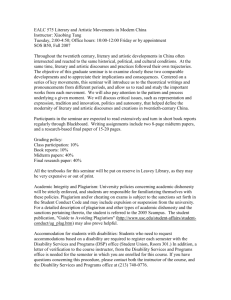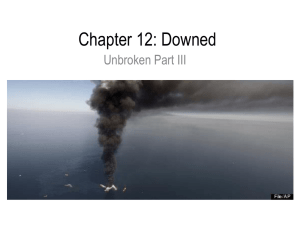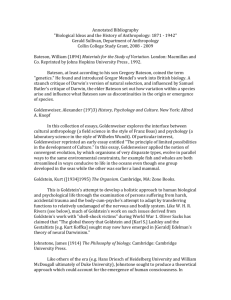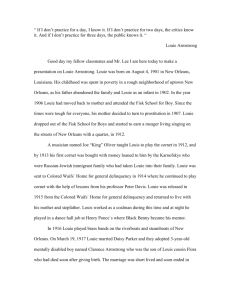2:45 p.m. Chen, Xi - Gmu - George Mason University
advertisement
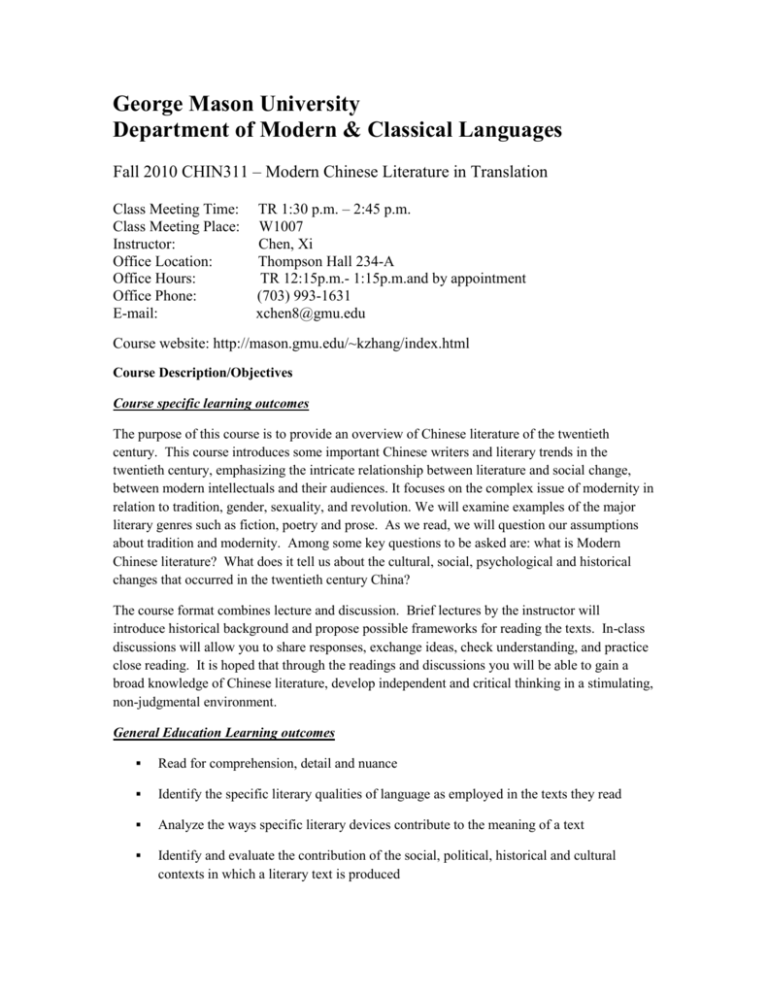
George Mason University Department of Modern & Classical Languages Fall 2010 CHIN311 – Modern Chinese Literature in Translation Class Meeting Time: Class Meeting Place: Instructor: Office Location: Office Hours: Office Phone: E-mail: TR 1:30 p.m. – 2:45 p.m. W1007 Chen, Xi Thompson Hall 234-A TR 12:15p.m.- 1:15p.m.and by appointment (703) 993-1631 xchen8@gmu.edu Course website: http://mason.gmu.edu/~kzhang/index.html Course Description/Objectives Course specific learning outcomes The purpose of this course is to provide an overview of Chinese literature of the twentieth century. This course introduces some important Chinese writers and literary trends in the twentieth century, emphasizing the intricate relationship between literature and social change, between modern intellectuals and their audiences. It focuses on the complex issue of modernity in relation to tradition, gender, sexuality, and revolution. We will examine examples of the major literary genres such as fiction, poetry and prose. As we read, we will question our assumptions about tradition and modernity. Among some key questions to be asked are: what is Modern Chinese literature? What does it tell us about the cultural, social, psychological and historical changes that occurred in the twentieth century China? The course format combines lecture and discussion. Brief lectures by the instructor will introduce historical background and propose possible frameworks for reading the texts. In-class discussions will allow you to share responses, exchange ideas, check understanding, and practice close reading. It is hoped that through the readings and discussions you will be able to gain a broad knowledge of Chinese literature, develop independent and critical thinking in a stimulating, non-judgmental environment. General Education Learning outcomes Read for comprehension, detail and nuance Identify the specific literary qualities of language as employed in the texts they read Analyze the ways specific literary devices contribute to the meaning of a text Identify and evaluate the contribution of the social, political, historical and cultural contexts in which a literary text is produced Evaluate a critical argument in others’ writing as well as one’s own This course is part of the University General Education Program. The General Education mission statement is in the University Catalog (p. 9) and on the web at http://www.gmu.edu/departments/provost/gened/ Required Textbooks The Columbia Anthology of Modern Chinese Literature. Eds. Joseph S.M. Lau and Howard Goldblatt. Modern Asian Literature Series. New York: Columbia University Press, 2007. The literature of China in the twentieth century. Bonnie S. McDougall and Kam Louie. New York : Columbia University Press, c1997 Recommended Reading Modern Chinese Stories and Novellas, 1919-1949. Eds. Joseph S.M. Lau, C.T. Hsia, and Leo Ou-fan Lee. Modern Asian Literature Series. New York: Columbia University Press, 1981. Additional Readings will be available in class. Course Requirements 1. Attendance & in class performance & blackboard discussion Attendance of class sessions is crucial. Students should keep in mind that part of their grade is based on attendance and that absences count against them regardless of the reasons. There will be no penalty for the first two missed classes. After that, however, each absence will reduce the final grade by one percentage point. Class participation and blackboard discussion are expected since talking with fellow students is the best way to learn. So earn your good grade the fun way—start and keep talking in class! Don’t be afraid to make mistakes. 2. Weekly Journal (1+ page each entry; typed, double-spaced, size 12) Students are required to keep a reading journal, which will help you articulate your thoughts on the texts and will contribute to productive and successful discussions in class. Generally, one response is required each week. Please read the syllabus carefully for the specific texts. 3. Quizzes A pop quiz will be given on any day. It will be a couple of simple questions on material covered in the class lectures. Be prepared and read before class. 4. Presentation (10-minutes oral report and 3-4 pages of written report, double-spaced, size12) Possible topics for the presentations are studies of themes, subject matters, such as modernity, gender, revolution and so on to analyze how they are represented in the text. You can also study the characterization in the stories, or examine the characters in the context of historical and sociopolitical changes. Other elements of literature, such as narrative voice, style, etc can be the focus of your presentation, too. In all, you need to make a clear argument/present a reasonable opinion, supported by details from the text and/or your research. Your presentation should inform your audience your thoughts, questions, and insights about the texts. Please do NOT just summarize the text(s), except when you are presenting the criticisms. But you are encouraged to ask thoughtful questions. More details will be given in class. 5. Final Paper (6-8 pages, 12 point font, double spaced Due4/29) You final paper analyzes and discusses at least one of the texts we cover in class. This paper is a formal academic paper, in which you must present your thesis statement (your main argument), supported by well-organized evidences from the text(s) or your research. You must cite your sources. Failure to cite will be considered plagiarism and reported to the University. It will also result in an F for the course. This paper is a critical analysis of the text(s), characters, etc. Remember Critical analysis is NOT: 1. A summary. 2. Broad generalizations without further support and analysis 3. Citing long quotes from the readings without analyzing them or explaining their importance to you or to us More details will be given in class. 6. Midterm Exam in class. 7. Final Exam in class. Final exam consists of short essay questions. A review sheet will be given a week before the exam. Please bring your “Blue Book”. 8. Extra Credits Some Extra Credit reports will be offered to anyone who would like to go extra miles to learn in more depth about modern Chinese culture, art, or literature. However, no extra credit points will be accepted after the final exam. Using Student Work for Assessment (approved by Provost Peter Stearns in Dec. 2008) All academic programs at Mason (including the General Education Program) have student learning outcomes that are assessed periodically. Your work from this course may be selected for use in such an assessment. Your anonymity is assured and your grade will not be affected. At any time, you may contact the Office of Institutional Assessment (assessment@gmu.edu) with questions, concerns, and comments about the use of your work. Honor Code. The George Mason University Honor Code is in effect throughout the entire duration of the course and applies to all course work carried out inside and outside the classroom. It is the responsibility of each student to be familiar with the GMU Honor System and Code as laid out in the Student Handbook. Please refer to http://www.gmu.edu/mlstudents/handbook/honor.html for detailed information. Policy on Disabilities *Students with disabilities who seek accommodations in a course must be registered with the GMU Disability Resource Center (DRC) and inform the instructor, in writing, at the beginning of the semester. Please see www.gmu.edu/student/drc or call 703-993-2474 to access the DRC. Grades Final grades are composed as follows: Attendance + in class performance + blackboard discussion 20% Weekly Journal 10% Quizzes 10% Presentation 10% Final Paper 20% Midterm Exam 10% Final Exam 20% Grading Scale A AB+ B BC+ C CD F 100-93 92-90 89-87 86-83 82-80 79-77 76-73 72-70 69-60 59- 0 Session Schedule Date Week 1 8/31 T Class Introduction to the Course What is “modern” “Chinese” literature? Screening: China, in Revolution 1911-1949 Discussion 9/2 R Screening: China, in Revolution 1911-1949 continued Discussion Sign up for the presentation Week 2 9/7 T The "Literary Revolution" and May Fourth period Lu Xun, “Preface to Call to Arms,” Sign up for the presentation 9/9 R Lu Xun, “A Madman’s Diary” McDougall & Louie 13-30; 93-99 Week 3 9/14 T Lu Xun, “Kong Yi Ji” “Medicine” 9/16R Lu Xun, “New Year’s Sacrifice” Week 4 9/21 T Literary Groups and Societies Literary Research Association Creation Society Crescent Society Yu Dafu “Sinking” McDougall & Louie 21;53; 100-102 9/23 R Shen Congwen Screening: Girl from Hunan McDougall & Louie 105-109; 125-128; Week 5 9/28 T Screening: Girl from Hunan continued Shen Congwen “Xiaoxiao” 9/30R Mao Dun “Spring Silkworms” Modern Poems in early 20th century McDougall & Louie 109-114 Week 6 10/5 T Xu Zhimo “Second Farewell to Cambridge”; “Chance” Wen Yiduo “Dead Water” Dai Wangshu “Rainy Alley” McDougall & Louie 31-42; 51-54;5459;68-69 10/7 R Ding Ling “When I was in Xia Village”, “Miss Sophie’s Diary”(recommended) McDougall & Louie 130-134; 212-215; Week 7 10/12 T 10/14 R Columbus Day recess Tuesday classes do not meet Ling Shuhua “the Night of Midautumn Festival” ;“Embroidered Pillows” McDougall & Louie 121-123 Week 8 10/19T Zhang Ailing “Sealed Off” “the Golden Cangue”(recommended) McDougall & Louie 249-251 10/ 21 R Zhou Zuoren, “Reading on the Toilet,” Lin Yutang, “My Turn at Quitting Smoking,” Liang Shiqiu, “Haircut,” Zhu Ziqing, “The Silhouette,” McDougall & Louie 43-45; 46; Week 9 10/ 26 T Midterm Exam 10/ 28 R Literature after 1949 Hundred Flowers Movement Anti-Rightist Campaign Cultural Revolution Screening “to Live”(or “Morning Sun) Week 10 11/ 2 T 11/ 4 R Screening “to Live” (or “Morning Sun) continued Week 11 11/ 9 T Misty Poetry Bei Dao “Answers”, “Declaration” Shu Ting “To the Oak” Gu Cheng “The Generation”, “Far and Near”, “An Ending(recommended)” 11/11 R Can Xue “Hut on the Mountain” Yu Hua “On the Road at Eighteen” McDougall & Louie 409-410; 410-412; Week 12 11/ 16 T Liu Heng “Dog Shit Food” Wang Zengqi “Little Hand Chen” McDougall & Louie 412-414; 11/18 R Bai Xianyong, “Winter Night” Wang Zhenhe “An Oxcart for a Dowry” McDougall & Louie 444 Week 13 11/ 23 T 11/ 25 R Yuan Qiongqiong, “Tales of Taipei,” Zhu Tianwen, “Find De Siecle Splendor,” Week 14 11/ 30 T 12/ 2 R Week15 12/7T 12/ 9 R 12/ 14 T Chen Ruoxi “The Tunnel” Ba Jin “Remembering Xiao Shan” Wen Jie Ruo “Living Hell” Happy Thanksgiving! No class. Liu Yichang “Wrong Number” XiXi “a Woman Like me” Ji Xian “A Wolf” Yu Guang zhong “Nostalgia” Luo Fu “ City:Saigon, 1967” Xia Yu “Sweet Revenge” Final Paper Peer Review Screening: “the Wedding Banquet” Screening: “the Wedding Banquet” Continued Final Exam (1:30pm-4:15pm) in our classroom Happy holidays McDougall & Louie 189-208; 325-345 McDougall & Louie 128-130, 215-217 McDougall & Louie 432-435; 435-436; 436-438 Final Paper Due
